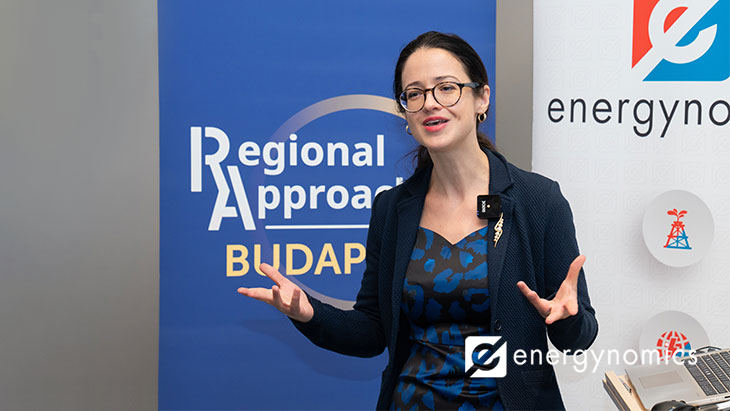Reducing CO2 emissions is the bridge between traditional industries and the renewable energy industry, emphasized Anca Mutu-Kovács, SAMER / LRQA, at the conference “Regional approach Budapest: Cooperation” organised by Energynomics. She then added that any investment in renewables must take into account a technical due diligence analysis to maximize its chances of producing at full capacity.
“We are all trying to achieve the highest level of decarbonisation, and some industries have already become as efficient as possible. For some industries, such as the chemical industry, it is difficult to advance on this path of decarbonization if they do not change their energy source. Decarbonization is the bridge that unites the classic industry with the industries of the future, as renewable ones are considered. Renewables are the best solution in the given context”, believes Anca Mutu-Kovács.
However, in order to produce energy from renewable sources, Europe relies on technologies located far from the place of consumption, and this is a vulnerability, because potential malfunctions in the supply based on these technologies can paralyze the entire sector. Also, at the EU level there are still not enough commercial projects for the production of energy from renewable sources.
“We have to realize that now both the photovoltaic industry and the wind industry are in China, and if we encounter a situation where one of the channels is blocked, we are paralyzed. We rely on technologies that are far removed from us. We talk about renewable projects, but how many of them are in operation in Europe? Not too many. Commercial solar parks are a novelty, somehow, as ridiculous as that may sound. The same is the case with the concept of technical due diligence”, adds Mutu-Kovács.
Technical due diligence is an in-depth analysis of the state of a company from a technical perspective, including products, infrastructure and technical architecture, product roadmap, services, practices and IT services. Thus, the decision to invest in a project to generate energy from renewable sources must take into account the existing conditions in the place where it is to be installed so that the investor has the most complete picture of the investment.
DOWNLOAD THE PRESENTATION OF ANCA MUTU-KOVÁCS
For example, a significant advantage is the fact that Hungary is preparing investments in the development of batteries for energy storage, and the proximity of these units to places of consumption creates the conditions for obtaining more affordable energy. In the case of photovoltaic panels, it is not always an advantage to have high solar radiation, but it is always an advantage for the operator of that plant to carry out an assessment of the potential yield, which can be a decisive factor in favor of the investment.
“Things are complicated with solar energy because you don’t always need a lot of sun. Probably the climatic regime in Romania and Hungary is better than in Saudi Arabia”, Mutu-Kovács appreciated.
The conference “Regional Approach Budapest – Cooperation” is organized by Energynomics with the support of our partners: ABB România, Kawasaki Gas Turbine Europe, Volt.
